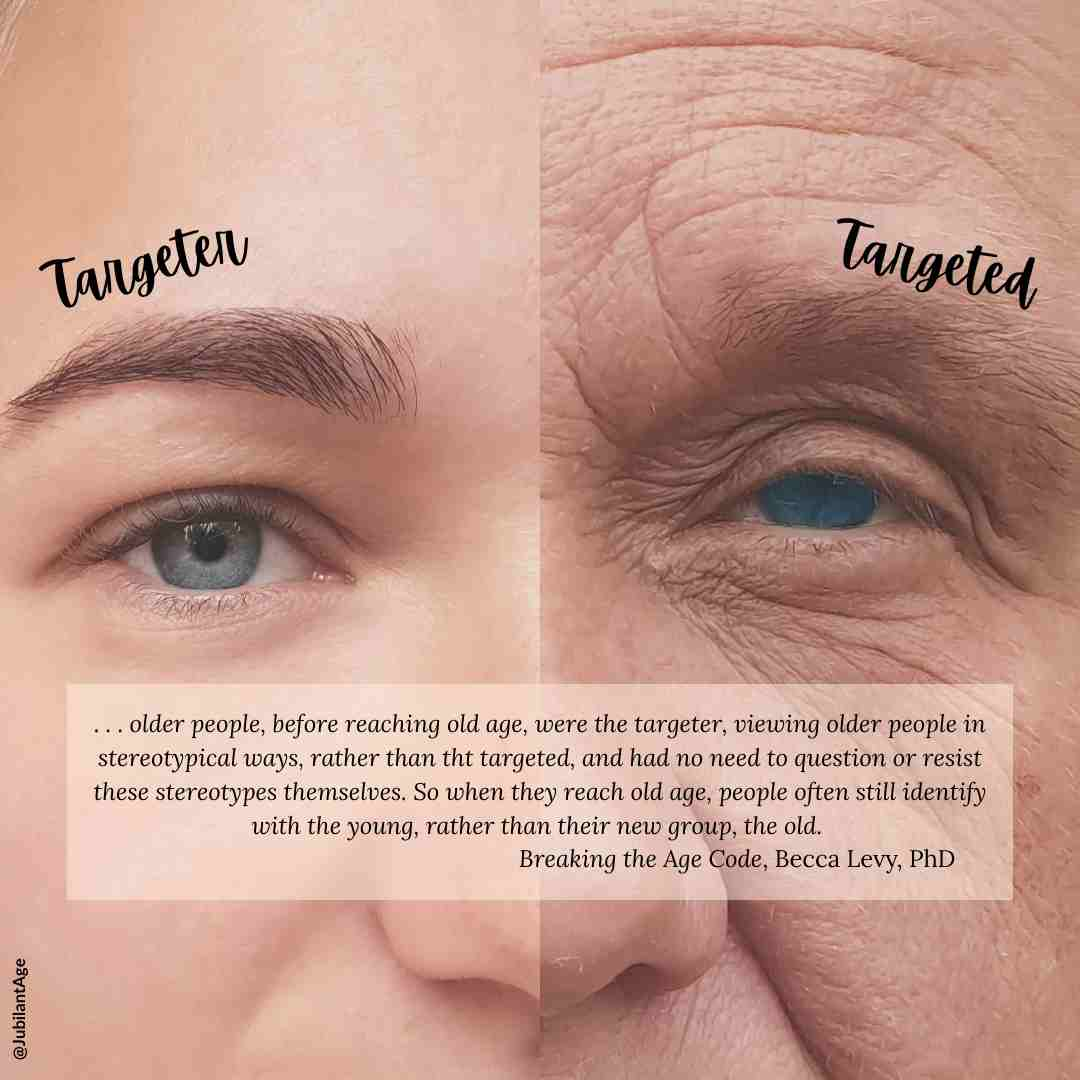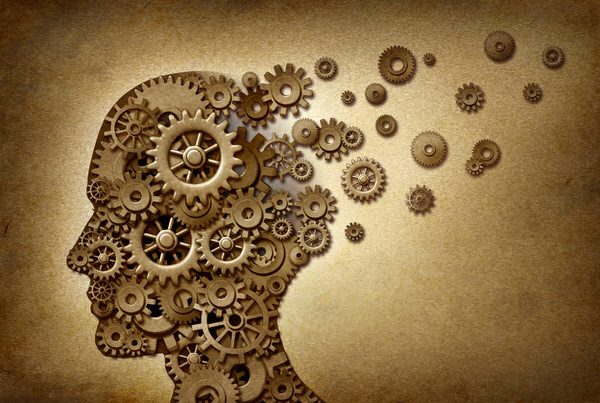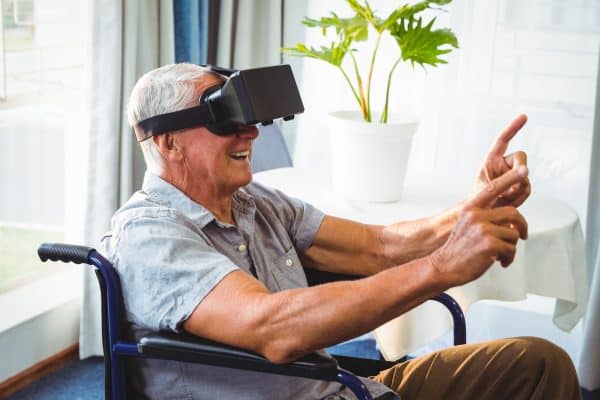Here’s a quick way to assess your age beliefs. Think of an older person. It can be a person you know or someone you imagine. What are the first five words or phrases that come to your mind as you consider this person?
Do this now. Once you’re finished, keep reading.
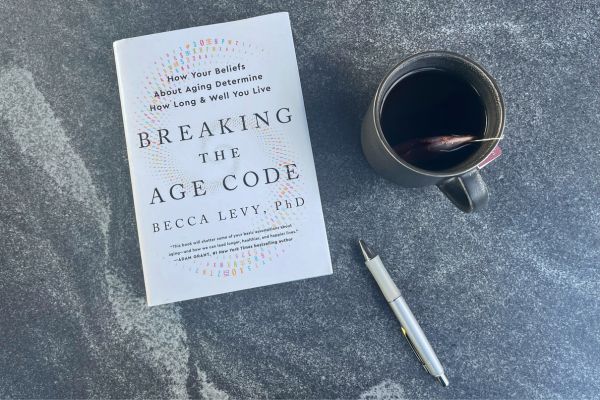
Breaking the Age Code
Yale professor Dr. Becca Levy starts her class on Health and Aging each year with this question about words you associate with being older. Once you’ve listed the first five things that come to mind when you picture an older person, take a look at them. How many of the words or phrases you thought of were negative? How many were positive?
Dr. Levy’s groundbreaking research demonstrates how our cultural and personal age beliefs affect things like memory loss, hearing decline, and cardiovascular events — elements of aging that once were thought to be entirely physiological AND inevitable. But Levy presents study after study to refute the belief that aging necessarily equals decline.
She details her findings, as well as how to change your age beliefs, in Breaking the Age Code: How Your Beliefs About Aging Determine How Long & Well You Live.
What are age beliefs?
Age beliefs are mental maps of how we expect people to behave based on their age. Our culture affects our beliefs. For example, in many Asian countries, older people are revered for their wisdom and experience. But in the United States, negative stereotypes and implicit bias result in older people being cast aside, derided, and even considered a drain on society.
How do age beliefs affect health?
An especially insidious aspect of negative age beliefs is that they become self-referential. As Levy explains, we absorb negative stereotypes about older people our whole lives. We view aging in negative ways without any need to question or resist cultural stereotypes.
We internalize these stereotypes unconsciously, but when we grow older, we apply them to ourselves. For example, Levy cites the 25-year-old who misplaces her keys. No big deal.
But if you misplace your keys at age 75, you might attribute it to impending dementia. You might see the situation as a road sign along a one-way track to becoming a burden to your family. After spending your entire life absorbing beliefs about older people’s mental decline, you interpret your own brief mental lapse as a harbinger of worse things to come. It’s a self-fulfilling prophecy. 1
Levy calls this phenomenon the transition from “targeter to targeted.”
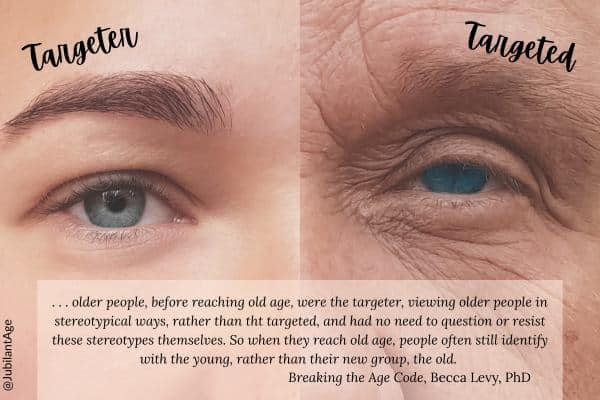
Impact on both physical and mental health
With regard to the link between age stereotypes and physical health, Breaking the Age Code cites a study in which older subjects in a residential facility were “primed” with positive messages about aging. These same people saw improvements in their balance and walking speed over a period of weeks, not months. 2
Other studies showed how negative age beliefs increase stress, which is widely believed to correlate with inflammation, physical and mental health. They measured participants’ levels of the stress hormone cortisol over a 30-year period. Those with negative age beliefs experienced a 44% rise in cortisol levels over 30 years, compared to a 10% decline among participants with positive age beliefs. 3
Further, studies among veterans revealed a concrete link between age beliefs and mental health. Subjects with positive age beliefs were far less likely to develop suicidal ideation, depression and anxiety than people with negative age beliefs over a 4-year period. 4
Positive age beliefs are good for your health as you age
7.5 years additional longevity
A finding that has gained widespread attention is Levy’s conclusion that positive age beliefs can give you an additional 7.5 years of life. Her work found the effect of age beliefs to be more powerful than those conferred by gender, socioeconomic status, loneliness and other factors. Positive age beliefs offered greater longevity benefits than low cholesterol or low blood sugar (which offer 4 extra years of life), low body mass index (1 extra year) or avoiding smoking (3 extra years). 5
Offset genetic risk of Alzheimer’s
Perhaps even more exciting, Levy’s team found that among people who carried the risky APOE-4 gene, those with positive age beliefs were 47% less likely to develop dementia than those with negative ones. Thus, even among people whose genetic profiles predisposed them to develop Alzheimer’s, positive age beliefs played a significant role in warding off cognitive decline. 6
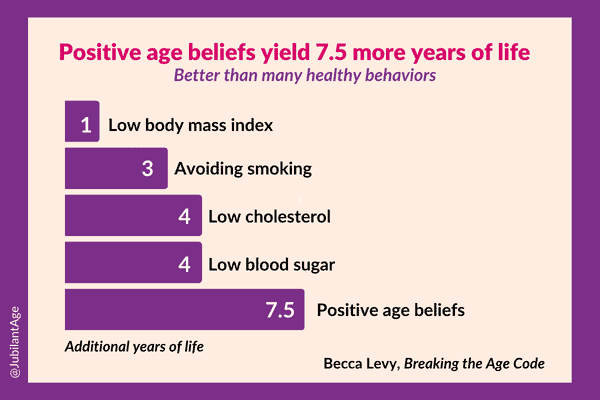
Good news: you CAN change your age beliefs
If your reaction to Becca Levy’s research is anything like mine, you want to know HOW to improve your age beliefs. The good news is that you can, and it’s not difficult.
My next post will summarize Dr. Levy’s ABC method for turning around the beliefs we’ve been absorbing all our lives. If you haven’t already signed up for my newsletter, make sure to do so — you won’t want to miss this!
Notes
This article cites research from Levy, Becca. (2022). Breaking the age code: How your beliefs about aging determine how long and well you live (1st ed.) Page numbers follow:
1 Page 17
2 Page 46
3 Page 77
4 Page 78
5 Page 93
6 Page 63
Images via AHR/Canva
